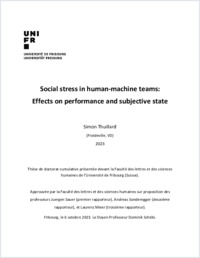Social stress in human-machine teams : effects on performance and subjective state
SPR
- Thuillard, Simon
- Sauer, Juergen (Degree supervisor)
- Fribourg (Switzerland), [2024]
1 ressource en ligne (90 pages) ; 1 fichier pdf
Thèse: Université de Fribourg (Suisse), 2023
English
Social stress at work, which refers to stressful social interactions with colleagues or clients, can substantially affect health and well-being. Due to technological advancements, an increasing number of employees collaborate with machines that might also induce social stress. The present work used an experimental approach by conducting three lab studies to investigate the possible consequences of both human and machine-induced social stress on performance and subjective state. The first study operationalized the stressor illegitimate task assignment for the first time in the lab. The second study compared the effects of human versus machine versions of the stressor negative performance feedback. The third study used a combination of two stressors (negative feedback and ostracism) in a simulation of a complex work environment, once again comparing human versus machine-induced social stress. Overall, the results suggest that social stress does not impair performance regardless of its source. However, some subjective variables, such as affect, anger, or perceived justice, may be affected by both human and machine-induced social stress. In some aspects, machines appear to be as stressful as humans. I discuss the practical implications of these results for work settings using hybrid teams and the theoretical implications for different work or social stress models. Finally, I also consider the limitations of the studies before outlining directions for future research on social stress.
- Faculty
- Faculté des lettres et des sciences humaines
- Language
-
- English
- Classification
- Psychology
- Notes
-
- Bibliographie
- License
- Open access status
- diamond
- Identifiers
-
- SWISSCOVERY 991171838389905501
- DOI 10.51363/unifr.lth.2024.026
- URN urn:nbn:ch:rero-002-121769
- Persistent URL
- https://folia.unifr.ch/unifr/documents/327387
Statistics
Document views: 367
File downloads:
- ThuillardS: 474
